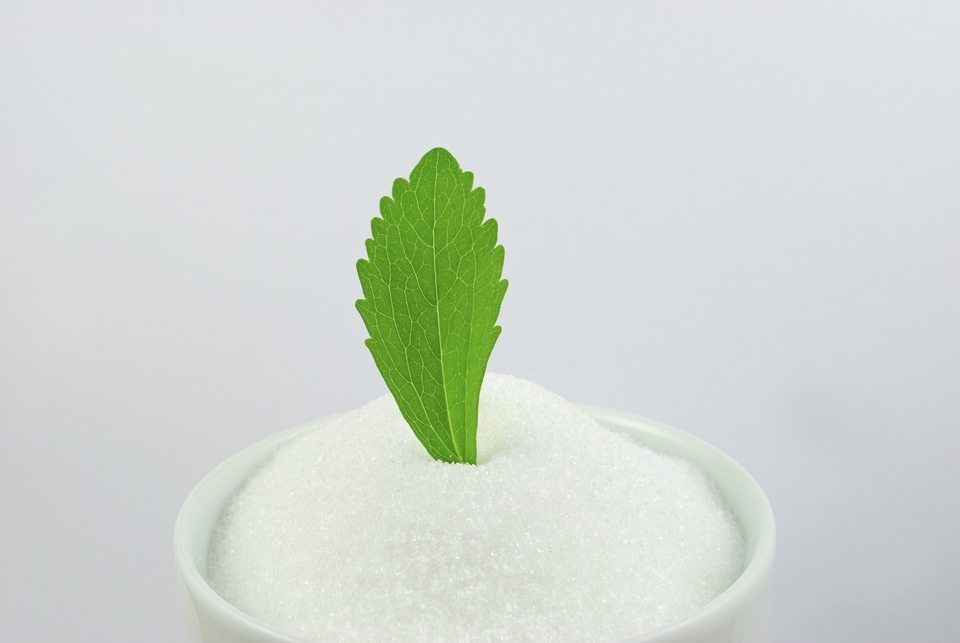Make The New Year Sweet With Stevia
By: Meghan Flynn, MS, RDN
 With every song sung to bid farewell to the old year, the inevitable ‘New Year, New You’ diet and exercise resolutions come ringing in. Tops on most lists: to lose weight, get more exercise and eat healthier.
With every song sung to bid farewell to the old year, the inevitable ‘New Year, New You’ diet and exercise resolutions come ringing in. Tops on most lists: to lose weight, get more exercise and eat healthier.
By February, 80 percent of resolutions are toast! One of the primary reasons is that they aren’t specific enough. Rather than a general “lose weight” resolution, try breaking it down into easy to implement strategies.
Say Goodbye to 2016 One Teaspoon at a Time
From a health standpoint, one of the best resolutions you can make is to eat fewer calories and less added sugar. Experts claim that consuming too many calories and too much added sugar goes beyond just contributing to weight gain, it may also contribute to other health problems such as type-2 diabetes and heart disease.
Every 4 grams of sugar listed on food labels equals one teaspoon, and one teaspoon of sugar adds up to 16 calories. That may not seem like it will make a dent in the diet, but here is the reality:
- Both the World Health Organization (WHO)1 and the U.S. Dietary Guidelines for Americans2 advise limiting added sugars to less than 10 percent of total daily calories. That is no more than 200 calories (12.5 teaspoons) from added sugars in a typical 2,000 calorie/day diet.
- In the U.S., the average intake of added sugars adds up to 270 calories, or more than 13 percent of calories per day3A study in Europe found that added sugars contributed 7 to 11 percent of total energy intake in adults and represented a higher proportion of children’s energy intake (11 to 17 percent)4. While, in China there is a growing concern about an increase in the consumption of sugar containing foods5.
- The American Heart Association goes even further and recommends that women get no more than 6 teaspoons of added sugar a day (about 100 calories or 24 grams), and that men consume no more than 9 teaspoons of added sugar (about 150 calories or 36 grams) per day6. Additionally, the WHO Guidelines concur that a further reduction of added sugars to below 5 percent or 6 teaspoons per day would provide additional health benefits1.
Although the science behind the recommendations of whether to cut added sugar consumption to 5 percent or 10 percent of calories continues to be debated, based on current health indicators and dietary patterns, there are benefits to limiting calories and sugar in the diet.
Some of the top sources for added sugars in the diet tend to be sugar-sweetened beverages, cereals, packaged baked goods and snacks, candy, dairy desserts like ice cream and even unexpected places like instant noodles and soups7. Reducing your consumption of these foods by incorporating reduced or zero-sugar versions can put you on the right track towards lowering your sugar intake.

Sweet Success Comes Over Time
Does replacing sugar with non-nutritive sweeteners have a positive impact on body weight?
To answer this question, researchers from the University of Bristol conducted a comprehensive review of the existing science on the effect of non-nutritive sweeteners to overall energy intake and body weight8. Their results clearly show that when non-nutritive sweeteners were used in place of sugar – in both adults and children – it resulted in reductions in overall calorie intake as well as body weight8.
The key to successfully reducing weight by replacing regularly sweetened beverages and foods with non-nutritive sweetened versions is to be conscious of not compensating for the calories saved by overindulging in other foods. Just because you ordered a diet soda does not mean you can have the fries!
Replacing sugar with reduced-calorie, reduced sugar foods made with sweeteners like stevia has the ability to influence weight management. When used correctly, non-nutritive sweeteners can help achieve personal as well as public health goals to reduce calorie and sugar intake, and improve overall health.

Taking Stevia Steps
Rather than making an overall goal to lose weight, take some immediate steps to put you in the right direction not just for weight loss, but overall health:- Substitute stevia leaf extract sweetener wherever possible for sugar, honey, agave, or other sweeteners
- In tea and coffee, reduced calorie/sugar foods with Stevia, and in your cooking
- Strive to get at least 30 minutes of exercise a day, even if broken down into 10 minute increments
- Be good to your gut by adding probiotics from cultured and fermented dairy foods that are reduced or zero-sugar added products
- Eat more whole grains, fruits and vegetables
- Snack on a handful of nuts rather than grabbing a candy bar
These tips are adaptable lifestyle changes you can make over the course of the year and are meant to last a lifetime, as opposed to those New Year resolutions that fail by the second week in February.
For creative ways to cook with stevia visit the PureCircle Stevia Institute’s recipe section.
Cheers to a sweet New Year (with less added sugar)!
REFERENCES
- World Health Organization Guideline: Sugars Intake for Adults and Children http://www.who.int/nutrition/publications/guidelines/sugars_intake/en/; March 2015
- Dietary Guidelines for Americans 2015–2020 8th Edition: https://health.gov/dietaryguidelines/2015/guidelines/
- Dietary Guidelines for Americans 2015- 2018, 8th edition, Added Sugars page 54: https://health.gov/dietaryguidelines/2015/resources/2015-2020_Dietary_Guidelines.pdf
- Azaïs-Braesco V, et al, A review of total and added sugar intakes and dietary sources in Europe, Nutr J.2017 Jan 21;16(1):6. doi: 10.1186/s12937-016-0225-2.
- Liu S, et al. Consumption status and trend of added sugar containing food among Chinese from 2002 to 2012. Wei Sheng Yan Jiu. 2016 May;45(3):398-401 [Abstract].
- American Heart Association Sugar 101, http://www.heart.org/HEARTORG/HealthyLiving/HealthyEating/Nutrition/Sugar-101_UCM_306024_Article.jsp#.WIdvqBsrI2x.
- Martínez SE, et al. Ultra-processed foods and added sugars in the US diet: evidence from a nationally representative cross-sectional study BMJ Open 2016;6:e009892. doi: 10.1136/bmjopen-2015-009892
- Martínez SE, et al. Ultra-processed foods and added sugars in the US diet: evidence from a nationally representative cross-sectional study BMJ Open 2016;6:e009892. doi: 10.1136/bmjopen-2015-009892
- Rogers PJ, et al. (2016). Does low-energy sweetener consumption affect energy intake and body weight? A systematic review, including meta-analyses, of the evidence from human and animal studies. International Journal of Obesity. DOI 10.1038/ijo.2015.177.

